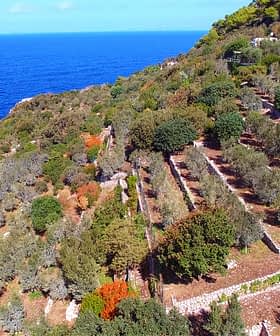Omics Ensure the Authenticity of Portuguese Olive Oils
Genomics and metabolomics are at the core of a research study to authenticate and trace Portuguese extra virgin olive oils.
 Traditional oplive grove in Alentejo
Traditional oplive grove in AlentejoThe growing Portuguese olive oil industry may add a competitive advantage to its products thanks to the Portuguese olive oil omics for traceability and authenticity, also known as the Por30 project.
The research effort, which is being led by the University of Évora, aims to ensure the authenticity and traceability of Portuguese oils using genomic and metabolomic approaches that address geographical and varietal aspects and differences of olives across Portugal.
The metabolomic approach gives us a lot of information about the chemical composition of olive oils.
Authenticity and traceability are emerging topics in food science. Food authentication procedures help ensure the authenticity and origin of food products as well as the identification of fraudulent practices. An industry challenge is the development of reliable analytical certification tools to meet these objectives.
“Genomic and metabolomic approaches are more reliable than other approaches to authenticate and trace olive oil,” Maria João Cabrita, from the food science group of the the University of Évora’s Institute of Mediterranean Agricultural and Environmental Sciences (ICAAM), told Olive Oil Times.
See Also:Olive Oil Fraud“The metabolomic approach gives us a lot of information about the chemical composition of olive oils and we are trying to correlate chemical data with, or explain them, with some variables such as rain, temperature, location,” she added.
Traditionally, food authentication relied on the identification of chemical marker compounds, such as volatile and phenolic compounds, tocopherols, pigments, sterols, fatty acids, triacylglycerols and sensorial analysis.
Identification was then followed by the quantification and comparison of the obtained values with those established for genuine material. This approach had limitations and required that target molecules (markers) were previously identified.
The genomic approach is based on the olive oil DNA evaluation, as well as the definition of molecular markers for each olive variety studied.
The metabolomic approach uses a number of techniques, such as profiling and fingerprinting, focusing on the study of the volatile composition of oils using comprehensive multidimensional gas chromatography, as well as the study of mineral elements using ICP-MS techniques.
In addition, the study of stable isotope (SIRMS) composition of light elements by isotope ratio mass spectroscopy (IRMS) and the use of nuclear magnetic resonance spectroscopy to provide a spectral signature of the different fatty acids of monovarietal extra virgin olive oils are used to identify origin.
These techniques are also used to discriminate among other types of extra virgin olive oils, such as organic or nonorganic.
Portugal is the world’s seventh largest producer of olive oil and the fourth largest olive oil exporter. The country has recently seen its olive grove surface expand, impacting olive oil production. Since extra virgin olive oil is a high-quality product economically important for the country, it is imperative that Portugal has a thorough understanding of its olive varieties and oils, to protect the value of their uniqueness.
Alentejo is responsible for two-thirds of Portugal’s national olive crop and this is why Por30 has focused on this region and some of its most important olive varieties: Galega Vulgar, Carrasquenha, Cordovil de Serpa, Cobrançosa, Blanqueta de Elvas, Madural, and Verdeal Alentejana.
Picual and Arbequina have also been considered because of their global reputation and large presence in Alentejo, where the increase of super-intensive cultivation has made these nontraditional cultivars gain importance. A deeper knowledge of Portuguese olive varieties and the olive oils they produce can encourage the planting of more Portuguese olive varieties.
Por30 also studies some oils from Trás-os-Montes, north of Portugal.
“The original idea was to study more regions, but it was not an easy task to obtain the olive oils, since we need varietal olive oils,” Cabrita said.
Launched in 2016 and expected to end this October, Por30 is a national project involving Évora and Nova de Lisboa Universities, with some involvement of the National Institute of Agrarian and Veterinary Research, which provides assistance in olive oil sampling.
Samples have been delivered by several oil producers, although no olive oil Protected Designations of Origin or regulatory bodies have been engaged in the project.
“Apart from genomic, which is not yet finished, we can say that applying the correct statistical tools, the volatile composition of olive oil reflects the varietal origin of olive oils,” Cabrita said. “They have different volatile profiles that can be linked with the varieties.”
“Regarding the geographic origin, the isotopic ratios signature of olive oils from the north are different from the south,” she added, indicating that a certification seal is not planned at this moment. “We submitted an article that to the best of our knowledge is the first report that records and evaluates bulk δ2H [hydrogen isotope] of Portuguese extra virgin olive oils.”









